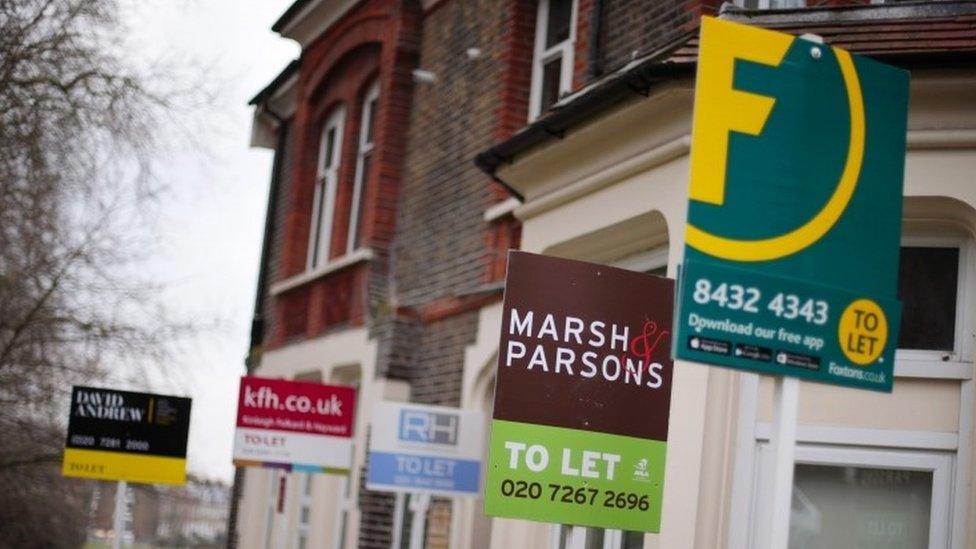General election 2019: Labour vows to cap rent rises for private tenants
- Published
- comments

Labour has vowed to "put bad landlords out of business" and bring in rent controls in England, if it wins power.
Private rents would not be allowed to go up by more than inflation - and landlords would be fined for letting out sub-standard property.
A Labour government would also bring in "open-ended" tenancies, to protect tenants from unfair evictions.
The Tories have also set out plans to help tenants - including scrapping "no fault" evictions.
Under Labour's "private renters' charter", landlords would face an annual "property MOT", with fines of up to £100,000 or forced repayment of rent if their properties are found to be sub-standard.
If the party wins the general election on 12 December, rent increases would be capped at the national inflation rate.
Areas with high rents would be able to make the case for further controls, local councils would get beefed-up enforcement powers and renters unions would be given government funding.
The BBC's assistant political editor Norman Smith said the policy reflected a wider view within Labour that the private sector could not be trusted in many areas and the state had to step in - a major dividing line with the Conservatives.
The private rented sector accounts for 21% of households in England - a figure that has doubled since 1997, according to the Office for National Statistics., external
Unsafe homes
Labour said its research has found that tenants collectively pay more than £10bn a year in rent to landlords letting out sub-standard homes.
The party claims one-in-four private rented homes in England are classed as "non-decent", meaning they are damp, cold, in disrepair or unsafe to live in.
Housing spokesman John Healey told BBC Breakfast "these are standards that cannot be allowed to go on for longer".
While most landlords provided decent and secure accommodation, he said successive governments had allowed "rogue landlords to flourish", while tenants had fewer rights and protections than if they were hiring a car or household goods.
"This is about making all properties and all landlords operate to the sort of standards that the better ones already do. When one in four kids are growing up in private rented accommodation, this is the type of home which must be better, more secure and more affordable," he said.
'Fear of eviction'
Under Labour's "open-ended" tenancies plan, tenants will only be able to be evicted on tightly-defined grounds, such as non-payment of rent or criminal behaviour in the property, or if the landlord plans to move back into the property.
The Conservatives have also vowed to outlaw Section 21 notices, which allow landlords to evict renters without a reason after their fixed-term tenancy period ends.
A Conservative spokesman said Labour's plans would "hurt the renters they claim to want to help by hiking up rents".
Polly Neate, chief executive of housing charity Shelter, said: "For decades renters have had to live with the fear of being evicted from their home for no reason, with damaging consequences particularly for families with children and the elderly.
"This election marks a major step forward in the battle to secure basic protections for those who rent, as Labour and the Conservatives have made clear that they will scrap this outrageous practice, and give renters the security and stability they deserve."
The Residential Landlords Association claimed Labour's proposals would "lead to a serious rental housing crisis".
Policy director David Smith said: "The sector does not need new obligations, but better enforcement of those that already exist."
What are the other parties proposing?

In addition to ending "no fault" evictions, the Conservatives say they would bring in "lifetime deposits", which would allow an initial lump sum to be transferred from one home to the next.
The party says in its manifesto these measures will protect tenants "from revenge evictions and rogue landlords". It also says it will strengthen rights of possession for "the many good landlords".
The Liberal Democrats say they will introduce longer-term tenancies and bring in controls on annual rent increases, linked to inflation.
The Green Party proposes rent controls, more secure tenancy agreements and an end to "no fault" evictions.
What happens in Scotland and Wales?
Housing policy is devolved to the UK's national parliaments.
In December 2017, changes to Scottish law brought an end to fixed-term tenancies. Rent increases can now only be made once every 12 months.
The current Welsh government has not indicated an intention to pursue such a policy, external.
In Northern Ireland, there is rent control on unfit private tenancies that began after 1 April 2007 and some other types of tenancy.


Do you have any questions about the election?
In some cases your question will be published, displaying your name and location as you provide it, unless you state otherwise. Your contact details will never be published. Please ensure you have read the terms and conditions.
Use this form to ask your question:
If you are reading this page and can't see the form you will need to visit the mobile version of the BBC website to submit your question or send them via email to YourQuestions@bbc.co.uk, external. Please include your name, age and location with any question you send in.